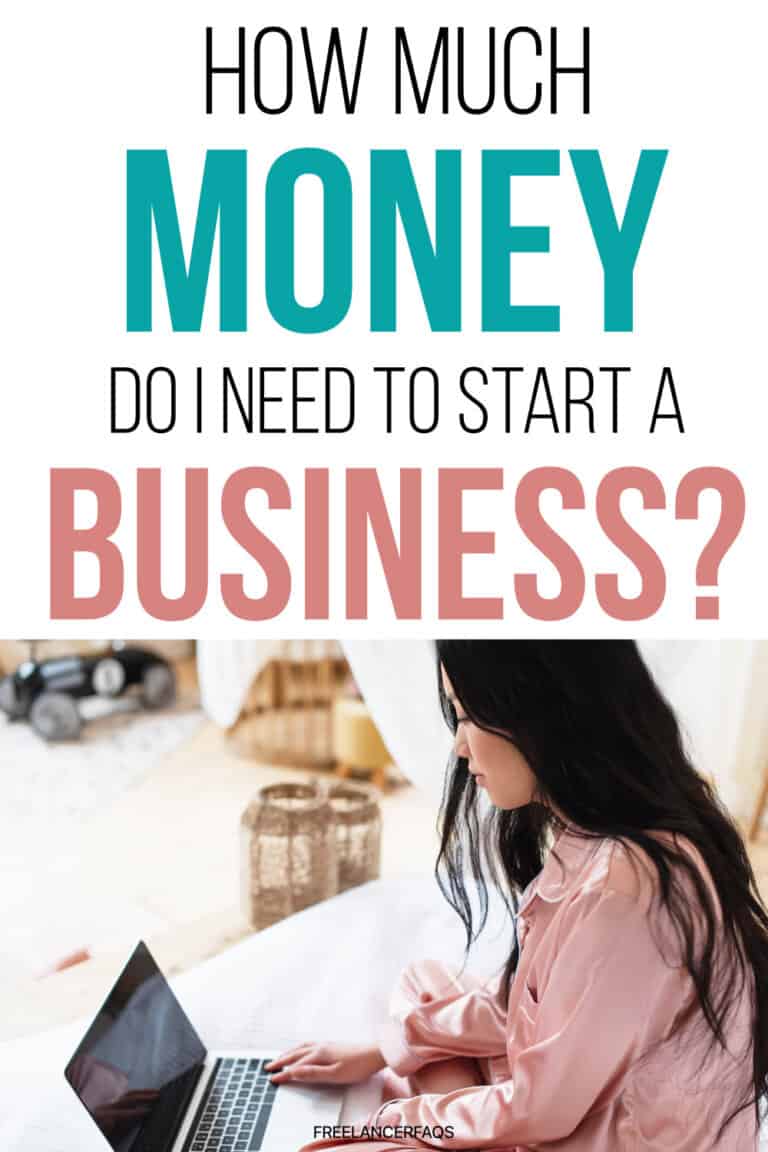So you want to start a business?
Whether it’s freelancing, starting an agency, or some other type of business, you should always have some funds stashed away in order to keep yourself (and your business) afloat.

[S]tarting a business can be stressful and daunting, if you have a solid plan in place, it will certainly be less scary.
According to Indeed.com, you should have at least six months worth of operating expenses on hand before starting a business (unless there is a global pandemic, then you should have a lot more).
While this is easy to say, it can be a little more difficult to do.
What if you don’t know what your operating expenses are yet?
What if you are still working your 9-5 while starting this business?
Where the heck do you even start?
Don’t worry.
While starting a business can be stressful and daunting, if you have a solid plan in place, it will certainly be less scary.
So let’s dive into how much money to save before starting a business?
How to Figure Out Your Startup Costs

It’s important to figure out your startup costs before starting your business so you are prepared in knowing how much you are going to need to save before starting your business.
While you might not realize it at first, there are going to be startup costs to your business, even if you are just freelancing.
Think about all of the different things you need for your business.
Are there any licenses that are required?
Do you need to purchase any inventory?
Do you need a website?
What type of equipment are you going to need? A new computer, new phone, new headphones?
What type of office supplies and office space are you going to need?
Are you going to have marketing costs?
Are you going to need to hire anyone or pay for a course to learn a new skill? Software?
And of course, don’t forget the money you are going to have to set aside to pay for taxes.
Even if you are just freelancing and are primarily using your computer, you still need your internet (unless you plan on doing all of your work at your local coffee shop).
You are still going to need to pay your taxes, have a phone, pens and notebooks to jot down notes and ideas (trust me, you’re going to have a lot of them!)
So before you go any further, take a look at what you already have and what you are going to need to start your business.
Even if you already have everything, remember, everything you are using for business is a tax writeoff, from your internet to your home office! (I’m not a tax professional and this is not professional tax advice)
Determine How Much You Need to Start a Business
There is a quote I have heard in the business world time and time again…
“If you treat it like a hobby it will pay you like a hobby, if you treat it like a business it will pay you like a business.” I’m not sure who said this, but it’s true.
If you want this to be a business rather than an expensive hobby, then you better put a solid plan in place and get your goals and priorities straight and write out a business plan.
Your Business Goals
“A goal without a plan is just a wish.”
Again, another popular quote I’m sure you have heard time and time again.
But what does it really mean? If you are setting a goal but don’t have a plan in place, then you are just making a wish, a “that would be nice.”
So before you pull out your credit card and start swiping away on those cute office supplies on Amazon, take a real good look at your business goals.
The goal here is to be realistic when setting your objectives.
While it would be nice to have a goal to make a million dollars in a year, as a freelancer, that is not super realistic.
What is realistic is to get one new client per month for the first six months.
But let’s dive into that a little bit deeper.
When setting goals, you want to be sure that you are setting goals for things you can control. You can’t exactly control getting a new client every month, but you can control how many people you reach out to, how many times you are asking for referrals, or how many gigs you are applying for.
The Business Plan
 Wait…didn’t we just go over our plan?
Wait…didn’t we just go over our plan?
The business plan is much more in depth and technical than what you wrote down for your goals. The business plan marries together your goals and financials to establish a cohesive picture of what your business is going to look like.
A business plan is not only a good document for you to personally have but is also necessary if you are going to go after any type of funding (more on that in a minute).
But what exactly should your business plan include?
While the details will depend on what type of business you are starting, there are a few essentials to include.
The Executive Summary
This part of the document includes your mission statement, the products or services you are offering, basic information about who is running and working in the organization, as well as high level growth plans.
Company Description
This is where you really get into detail about what your company offers and what problem it solves. You should be as specific as possible.
Talk about your customer demographics if you are a B2C business or the other types of businesses you will serve if you are a B2B business.
What is your unique selling point?
What is going to make you different from your competitors? This is the part of the business plan where you can really focus on your strengths.
Market Analysis
This is where you include all the information from your competitive research.
You need to have a solid understanding of the industry outlook and what your competitor’s strengths and weaknesses are. What are the different trends and themes in your market?
Organization and Management
The structure of your business should be outlined here.
Are you a sole-proprietor? An LLC? Talk about who will be running the company and how it will be structured.
Product or Service
This one is pretty self explanatory.
Rather than just list the products or services that you are going to offer customers, talk about the benefits as well.
Is there any research and development being conducted? What is the lifecycle of the product? What are your plans for intellectual property?
Sales and Marketing
How are you going to get new customers and retain your existing customers?
What does your marketing plan look like? What will your onboarding process be if you have one?
Financial projections
How much are you planning and making and spending?
This is going to be a critical section if you are planning on asking for funding. You need to have projections for at least five years in the future.
Will you need to upgrade equipment or hire new employees in the coming years? Be sure to account for those one off and annual expenses as well.
Bootstrapping Your Business vs Funding

Now, obviously all of these things can vary depending on what type of business you are planning on starting.
You can start freelancing for practically nothing, as a side gig, without quitting your 9-5 job.
All you need is a computer (which you probably already have), and a phone.
If you are planning on starting a business that is going to require more capital, then you can either bootstrap your expenses or look for funding.
Now, I am not a business funding expert, so I advise you to do your own research or reach out to a professional.
There are many ways that you can fund a business.
SBA loans, government grants for female and minority business owners, private equity, crowdfunding campaigns, or working with a business loan broker.
There are pros and cons to each one of these, so again, do your own research and speak with a professional in that funding source.
You can also bootstrap your business expenses.
Many companies have done this. It simply means that you are paying for any business expenses out of your pocket or directly from the profits of the company. This is certainly a viable option for smaller business ventures.
But again, just be sure that you are tracking all of those business expenses so that you can write them off come tax time.
How Much Money to Save Before Starting a Business
As you can see, there are many different factors that go into determining how much money you need to start a business. One key thing that you need to remember is that you need to be adaptable.
Starting and running a business rarely ever goes according to plan. You are going to encounter unexpected costs. Things are going to break, clients aren’t going to pay you, marketing is going to cost more than you projected.
The key is to plan for the unexpected. If you have enough money set aside to cover these potential disruptions, then you should be fine.
It’s not always about how much money you are spending, it’s about the value you are providing your clients and knowing your worth.




Leave a Reply